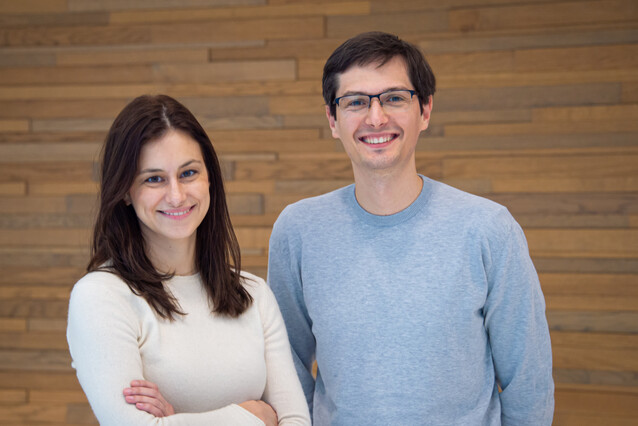Anna Obenauf and Clemens Plaschka elected EMBO Young Investigators
In an exceptional double-success for the IMP, Anna Obenauf and Clemens Plaschka were selected by the European Molecular Biology Organization (EMBO) to take part in the prestigious Young Investigator Programme. EMBO will support their research for the next four years and welcomes them to an international network of more than 600 life scientists.
Every year, the European Molecular Biology Organization (EMBO) selects the most promising group leaders in Europe to take part in the Young Investigator Programme. Candidates must have established their labs within the four years preceding their application and go through a highly competitive selection to join the programme. EMBO provides the selected candidates with financial, academic, and practical support to advance their careers, and integrates them into a vast network of more than 600 outstanding researchers. The Young Investigator Programme raises the visibility of junior researchers in the field of molecular biology in Europe and on a global scale. This year, 194 eligible applicants competed to enter the programme – only 26 were selected; in a striking double-success for the IMP, these included Anna Obenauf and Clemens Plaschka.
Anna Obenauf’s research group tackles clinical puzzles in the field of cancer molecular biology. Particularly, they investigate the molecular and cellular mechanisms that underlie tumour progression and immune evasion, employing a wide range of molecular biology, biochemistry, and in vivo approaches. Obenauf established her group at the IMP in 2016 after five years of postdoctoral research at Memorial Sloan Kettering Cancer Center in the United States. Her prolific research group is supported by an ERC Starting Grant since 2017, and she has been elected a member of the Austrian Academy of Sciences in 2019.
“It’s a great honour to be part of EMBO’s Young Investigator Programme. I look forward to the networking and training opportunities that the programme offers,” says Anna Obenauf. She also highlights how much her lab's research depends on the hard work of many: “For me, it’s really important to note that this success isn’t individual: it recognises the creativity and dedication of all the members of my group.”
Clemens Plaschka established his group at the IMP in 2018 after his postdoctoral studies at the Laboratory of Molecular Biology (LMB) in Cambridge, UK. His research team combines structural and biochemical methods to study how human messenger RNA is made. The team aims to understand how macromolecular complexes facilitate and regulate the maturation of messenger RNA. To investigate these mechanisms, scientists in the Plaschka lab apply, among others, advanced cryo-electron microscopy methods, which allow the visualisation of cellular processes at near-atomic resolution. Plaschka’s research is supported since 2020 by an ERC Starting Grant.
“I’m excited to be selected for EMBO’s Young Investigator Programme and I’m very grateful to my colleagues for their continuous support and contributions to our research,” says Clemens Plaschka. “As a young research group, we look forward to making good use of the programme's many networking, funding, and research opportunities.”
Other members of IMP faculty are taking or have taken part in EMBO’s Young Investigator Programme and have close ties to EMBO. Andrea Pauli is part of the programme since 2019 and was elected as EMBO member earlier this year. Luisa Cochella, now at Johns Hopkins University in the United States, joined the programme in 2018. Johannes Zuber was in the programme between 2015 and 2018, David Keays – now relocated at Ludwig-Maximilians-University Munich in Germany – and Alex Stark between 2013 and 2016, Tim Clausen between 2006 and 2009 and IMP Scientific Director Jan-Michael Peters between 2001 and 2004. The last three were since then elected to full EMBO membership.
Further reading
